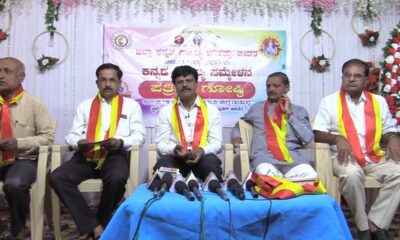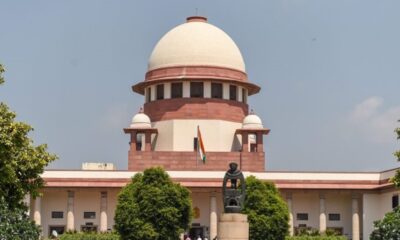india
Supreme Court Shifts Bitcoin Scam FIRs to CBI, Orders Trial in Delhi Court
Supreme Court transfers Bitcoin scam cases to CBI.47 FIRs, 87,000 Bitcoins, Rs 20,000 crore. Bhardwaj family accused; Amit deceased.

The Supreme Court issued a directive on Wednesday mandating the transfer of numerous First Information Reports (FIRs) linked to the Bitcoin cryptocurrency scam to the Central Bureau of Investigation (CBI) for a comprehensive inquiry and the subsequent filing of chargesheets.
A bench, presided over by Chief Justice D Y Chandrachud alongside Justices J B Pardiwala and Manoj Misra, further stipulated that the trials for these cases would be conducted at a specialized CBI court located at Rouse Avenue in New Delhi.
In a modification of its prior order dated August 30, 2019, which had granted anticipatory bail to the accused involved in over 45 FIRs, the bench declared that the earlier order was no longer in effect. If the accused are not granted regular bail by an alternative court, they are now required to seek it from the Delhi High Court, as per the court’s latest decision.
Moreover, the Supreme Court emphasized that the sum of Rs 1 crore, deposited with the apex court registry by the accused as a prerequisite for the anticipatory bail, must be transferred to the trial court in Delhi.
These legal proceedings before the Supreme Court pertain to the quashing of multiple FIRs filed against Amit Bhardwaj and others. They stand accused of deceiving investors across India by enticing them to engage in Bitcoin trading with promises of substantial returns.
The Enforcement Directorate reported the registration of approximately 47 FIRs against the accused, alleging widespread deception across the nation. The cases involve the trading of 87,000 Bitcoins valued at Rs 20,000 crore.
Amit Bhardwaj and his two brothers, along with their father, are implicated in the case. However, it’s noteworthy that Amit Bhardwaj has since passed away.
india
Congress Slams Waqf Bill as Unconstitutional, Vows to Fight in Supreme Court
In a bold move, the Congress party has announced plans to challenge the recently passed Waqf (Amendment) Bill, 2025, in the Supreme Court, labeling it a direct assault on India’s Constitution and the rights of the Muslim community.

In a bold move, the Congress party has announced plans to challenge the recently passed Waqf (Amendment) Bill, 2025, in the Supreme Court, labeling it a direct assault on India’s Constitution and the rights of the Muslim community. The legislation, which cleared both houses of Parliament after heated debates, has sparked widespread controversy, with opposition leaders arguing it undermines religious autonomy and equality.
The Waqf Bill, passed by the Lok Sabha with 288 votes in favor and 232 against, and later by the Rajya Sabha with 128 votes to 95, now awaits President Droupadi Murmu’s assent to become law. However, Congress leader Jairam Ramesh, the party’s General Secretary, took to X to declare that the Indian National Congress (INC) will soon contest the bill’s constitutionality in the nation’s highest court. “We are confident and will continue to resist all assaults of the Modi government on the principles, provisions, and practices contained in the Constitution of India,” Ramesh stated, emphasizing the party’s commitment to protecting constitutional values.
The bill introduces significant changes to the Waqf Act of 1995, including the inclusion of non-Muslim members in Waqf Boards and the Central Waqf Council—a move critics argue is discriminatory and lacks justification. Opposition leaders, including Congress and AIMIM chief Asaduddin Owaisi, have slammed the legislation for imposing arbitrary restrictions on Waqf property management, which they say violates Articles 14, 25, 26, 29, and 300A of the Constitution. These articles safeguard equality, religious freedom, minority rights, and property rights, respectively.
Opposition Leaders Rally Against Controversial Waqf Amendment Bill, Citing Threats to Muslim Rights
Congress MP Mohammad Jawed, who has already filed a petition in the Supreme Court, argued that the bill disproportionately increases state control over Waqf affairs compared to other religious trusts, such as those of Hindus and Sikhs, which enjoy greater self-regulation. The amendments also remove the Waqf-by-user doctrine—a principle upheld by the Supreme Court that recognizes properties as Waqf through long-standing religious use—further fueling concerns about the erosion of Muslim religious rights.
The debate in Parliament was intense, with the Rajya Sabha discussion stretching over 13 hours. Opposition leaders like Mallikarjun Kharge called the bill “anti-Muslim” and demanded its withdrawal, alleging it was designed to target Waqf properties for eventual privatization. “The intention behind this is questionable,” Kharge said, warning of potential communal polarization. Meanwhile, the government, led by the BJP, defended the bill as a step toward transparency and inclusivity, with Prime Minister Narendra Modi calling its passage a “watershed moment” for socio-economic justice.
The controversy has also led to political fallout, with two Janata Dal (United) leaders resigning in protest over their party’s support for the bill. As the legal battle looms, the Congress party’s challenge in the Supreme Court could set a precedent for how religious and property rights are balanced in India’s diverse democracy. Will the judiciary uphold the opposition’s claims, or will the Waqf Bill stand as a new framework for managing Muslim endowments? The nation watches closely as this contentious issue unfolds.
Karnataka
Karnataka BJP Kicks Off Overnight Protest Against Price Hikes and Muslim Quota
Led by BJP’s state president Vijayendra, the demonstration targets the Congress-led government’s recent price hikes and its controversial decision to introduce a 4% reservation for Muslims […]

Bengaluru, Karnataka: The political air in Karnataka is buzzing as the Bharatiya Janata Party (BJP) launched an overnight protest at Freedom Park in Bengaluru on Wednesday, April 2, 2025. Led by state president BY Vijayendra, the demonstration targets the Congress-led government’s recent price hikes and its controversial decision to introduce a 4% reservation for Muslims in government contracts. With emotions running high, this protest marks a bold stand against what the BJP calls a “burden on the people.”
The protest kicked off at 11 a.m. and stretched into the night, with Vijayendra slamming the Siddaramaiah government for making life tougher for everyday citizens. He pointed to the recent Rs 4 increase in Nandini milk prices—now the third hike since Congress took charge—as an “Ugadi gift” that’s left families struggling. “This government promised relief but delivered only rising costs,” Vijayendra said, vowing to keep the pressure on until the hikes are rolled back.
A Fight Against Rising Costs and Policy Shifts
The BJP isn’t stopping at milk prices. Vijayendra accused the government of jacking up water tariffs, petrol costs, and more, hitting the poor and farmers the hardest. He also took aim at the 4% quota for Muslims in public contracts, labeling it “unconstitutional” and a move that sidelines other backward classes like SCs, STs, and OBCs. “This isn’t about fairness—it’s about appeasement politics,” he argued, promising a statewide awareness campaign starting April 10 to rally public support.
The protest saw a strong turnout, with BJP MLAs, MLCs, former legislators, and district leaders joining in. Vijayendra stressed that this is just the beginning, with plans for demonstrations across all district centers on April 4 and taluk-level protests on April 5. “We’re here to fight for the people, not just make noise,” he added, urging the government to rethink its policies.
A Divided Response
While the BJP rallies its base, the Congress government defends its actions. The milk price hike, they say, supports dairy farmers by covering rising production costs, with Karnataka Milk Federation (KMF) Chairman Bheema Naik noting that prices here are still lower than in states like Gujarat or Delhi. On the Muslim quota, the government insists it’s based on socio-economic backwardness, not religion, aligning with long-standing policies under previous administrations.
Yet, the BJP remains unconvinced, accusing Congress of playing the minority card to win votes. The tension spilled into the streets of Bengaluru, with protesters chanting slogans and holding signs, creating a lively yet tense atmosphere. Police kept a close watch, ensuring the demonstration stayed peaceful as traffic flowed nearby and shops stayed open.
What’s Next for Karnataka?
This overnight protest is more than a one-night stand—it’s a signal of bigger battles ahead. With the BJP gearing up for a statewide movement, and the Congress digging in, Karnataka’s political scene is heating up. Residents are left wondering: Will the government back down, or will this spark a longer fight? For now, the focus is on Freedom Park, where voices of dissent echo into the early morning.
Stay tuned as this story develops. Whether it’s about your grocery bill or community rights, this protest could shape Karnataka’s future. Keep checking for the latest updates on price hikes, Muslim quota debates, and more!
india
Waqf Amendment Bill Heads to Rajya Sabha Today After Lok Sabha Approval
New Delhi: After a heated debate and a late-night vote in the Lok Sabha, the Waqf (Amendment) Bill, 2025, is set to take center stage in the Rajya Sabha on Thursday, April 3, 2025. The bill, which stirred up quite a storm in the Lower House, passed with 288 votes in favor and 232 against […]

New Delhi: After a heated debate and a late-night vote in the Lok Sabha, the Waqf (Amendment) Bill, 2025, is set to take center stage in the Rajya Sabha on Thursday, April 3, 2025. The bill, which stirred up quite a storm in the Lower House, passed with 288 votes in favor and 232 against after more than 12 hours of discussion that stretched into the early hours. Now, it’s the Upper House’s turn to weigh in, and people across India are watching closely.
The Lok Sabha debate kicked off Wednesday afternoon and didn’t wrap up until the clock was nearing 2 a.m. Lawmakers from all sides dug into the details, with the ruling National Democratic Alliance (NDA) pushing hard for the bill’s passage. Alongside the Waqf Bill, the Lok Sabha also greenlit a resolution supporting President’s Rule in Manipur—a busy night, to say the least.
What’s on the Rajya Sabha Agenda?
Today, Union Home Minister Amit Shah is expected to bring the Waqf Amendment Bill to the Rajya Sabha floor. He’ll also move a resolution to confirm President’s Rule in Manipur, which was imposed on February 13, 2025, under Article 356(1) of the Constitution. The Upper House has carved out eight hours for this debate, so buckle up—it’s going to be another long one.
Meanwhile, over in the Lok Sabha, Thursday’s lineup includes the Coastal Shipping Bill, 2024, presented by Minister Sarbananda Sonowal. There’s also a statement from Minister Dr. Chandra Sekhar Pemmasani about pulling funds from the Contingency Fund of India to cover interest on Sovereign Guarantee Bonds for Mahanagar Telephone Nigam Limited (MTNL). It’s a packed day for Parliament as the Budget Session nears its end on April 4.
Why the Waqf Bill Matters
The Waqf (Amendment) Bill aims to shake up how Waqf boards—bodies that manage properties dedicated to religious and charitable causes in the Muslim community—are run. The government says it’s all about boosting transparency and efficiency, but not everyone’s on board. Opposition parties have called it “unconstitutional” and a direct attack on minority rights, sparking protests and fiery exchanges in Parliament.
After the Lok Sabha gave its nod, the bill now faces the Rajya Sabha test. With the NDA holding a strong majority in both houses, the government’s confident it’ll sail through. Still, the opposition isn’t backing down, promising to fight tooth and nail to protect what they see as a cornerstone of India’s secular fabric.
A Late-Night Victory in Lok Sabha
The Lok Sabha session was anything but quiet. Opposition members slammed the government’s handling of Manipur, even as they supported the President’s Rule resolution. Amit Shah defended the Centre’s efforts, saying every step has been taken to restore peace in the troubled northeastern state. By the time the Waqf Bill vote rolled around, the tally—288 for, 232 against—showed the NDA’s numbers held strong.
For many, the bill’s passage feels like a turning point. Supporters say it’ll modernize Waqf property management, while critics fear it’s a step toward centralizing control and sidelining Muslim voices. Either way, the Rajya Sabha debate today will likely set the tone for what’s next.
What’s at Stake?
This isn’t just about a bill—it’s about trust, governance, and how India balances its diverse communities. The Waqf Amendment Bill has already sparked nationwide conversations, from political rallies to social media buzz. As it heads to the Rajya Sabha, all eyes are on how lawmakers will shape its future—and what it means for the country.
-

 india2 years ago
india2 years ago“Major Crash of Sukhoi Su-30 and Mirage 2000 Fighter Jets in Madhya Pradesh”
-

 Sports2 years ago
Sports2 years agoWFI meetings on April 16, elections likely to be discussed
-

 india1 year ago
india1 year agoPM Modi Meets Deve Gowda for Seat Sharing Talks
-

 india1 year ago
india1 year agoBengaluru: False threat to bomb Raj Bhavan
-

 india2 years ago
india2 years ago“AIMIM to Contest 50 Seats in Upcoming Telangana Assembly Elections”
-

 Entertainment1 year ago
Entertainment1 year agoAnant Ambani: Controversy at the Ambani Pre-Wedding Bash
-

 Entertainment2 years ago
Entertainment2 years agoRajinikanth is Moideen Bhai in ‘Lal Salaam’
-

 Videos2 years ago
Videos2 years agoBidar News : Press Meet Organized By Zilla Kannada Sahitya Parishad














